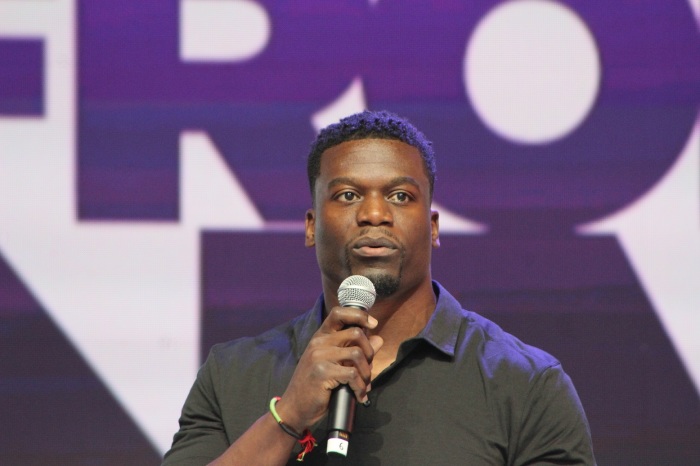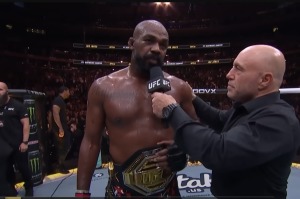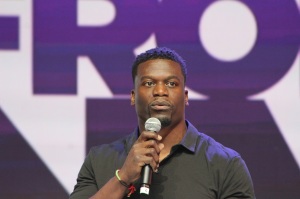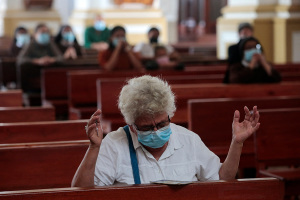Former NFL player Benjamin Watson on why strong men are the pro-life movement's secret weapon

Former NFL star, author and SEC football analyst Benjamin Watson believes the key to the pro-life movement’s success might come from an often-overlooked place: men reclaiming their God-given roles in society.
“Since the very beginning, manhood has always been under attack,” the 43-year-oldThe New Fight for Life author told The Christian Post. “The reason why is because God ordained the role for men to be protectors, providers, priests and prophets in their household. In order to create disorder, you attack families. This is nothing new to the United States. This has been going on for a very long time.”
The responsibility for men starts well before a child is born, the athlete stressed, extending to the way they support the mothers of their children, foster safe environments and exemplify love and sacrifice.
“If you don't use your voice to protect women and children, there are other men and other people who will step in and do that to the other side and will look to snuff out that life," he stressed. "Men have to understand who they are, they have to have the courage to speak out, and also realize that when men speak out ... other people see that. It’s amazing how, when one person stands up and lights a fire, others see that and believe that they can do it as well.”
In a cultural landscape that often sidelines male voices on issues like abortion, Watson said he sees an urgent need for men to step up with conviction, courage and compassion. This calling has shaped his own life — from his career as an NFL player to his work as a public advocate for life, most recently with the Human Coalition, an organization “committed to an audacious mission: to transform our culture of death into a culture of life — to end abortion in America.”
Engaging men in the pro-life cause is essential, not just to protect the unborn but also to uplift and support mothers, especially those who face difficult circumstances, Watson said.
“Men have to use their voice. The narrative out there is that this is not a men's issue. Biologically, it is a men's issue. By chromosomes, men have a role in this. You can't have a child without one, so you do have a role in it,” the father-of-seven said.
“Men are only told to stay out [of this issue] when they have the view that life should be protected and supported,” he added. “They're not told to stay out when they have the view that abortion should be on demand, for whatever reason, at any stage of development. It's not that [they] don't want men involved, [they] just don't want certain men involved.
“We need men. Abortion and so many other social ills will not end or not be curtailed until men make it so. And that's not to say that women don't have incredible power. You do, but it goes the way that men allow it to go. The reason why we're at this point when it comes to abortion is because men have allowed it to be so.”
Watson, the son of a pastor, said his deep conviction about the dignity of all human beings began in a household that celebrated the value of life. His parents, he said, modeled care and compassion for others, regardless of their background or circumstances.
"I always understood that God made people in His own image and that we had inherent value and dignity, no matter our ethnic background or our economic status or our stage of development," Watson said.
“That was something that was talked about at home, not necessarily from a political pro-life lens, but […] upholding the dignity of all life. […] I truly believe that people have dignity and that God cares, and that as believers, it's our job to take care of primarily the most vulnerable people. We see that throughout Scripture.”
This deep-rooted conviction later translated into action when Watson and his wife funded ultrasound machines for pregnancy resource centers in several cities where the athlete played in the NFL, including Baltimore and New Orleans.
This hands-on involvement quickly garnered attention, eventually leading to Watson’s public role within the pro-life movement, including speaking at the March for Life and joining the Human Coalition’s advisory board.
As a former NFL player, Watson has seen firsthand how men can feel disempowered or unsure of their capacity to lead in critical issues like family and life.
"A lot of men don't feel like they have what it takes, perhaps because they've made mistakes in the past, perhaps because maybe they didn't have a great role model as a father. And so, they doubt that they can do the things that they know are necessary," he said.
In his view, part of the solution lies in affirming men’s abilities, providing them with mentorship, and encouraging them to step into roles of leadership and care.
When asked how the pro-life movement can effectively engage younger generations, Watson, who also appears in the faith-based film "The Forge," highlighted the importance of education within families and communities.
Social media and schools are important, he said, but the primary place young people learn values is at home. He encouraged parents to model respect for all life and teach a "whole life ethic," stressing that, “We teach our kids to play basketball and learn coding; we must also teach them the value of human life.”
“How we speak about life, how we speak about our adversaries, how we speak about people who disappoint us or people that we don't agree with, is all part of that,” he said. “How they see us serve other people, the things they see us advocate for, all that blends into that conversation.”
Watson is deeply aware of the challenges in advocating for life amid a politically charged atmosphere. Looking ahead, he said the pro-life movement must emphasize both advocacy and service, blending legislative efforts with support for families in need. Citing Martin Luther King Jr., Watson acknowledged that while laws might not change hearts, they can set a cultural standard.
“Legislation is important,” he says, “because it sets the tone for what’s acceptable in any culture.” According to Watson, the real work lies in changing perspectives on life, which he said starts with addressing the inequities that drive people toward difficult decisions.
“Now, how do we do that? I think it all goes back to meeting people's needs,” he said.
In The New Fight for Life, Watson outlines practical policies that promote healthy family dynamics, such as child tax credits and paid leave and advocates for a focus on communities disproportionately impacted by abortion, such as black neighborhoods. By addressing systemic challenges in these communities, he said the pro-life movement can make a tangible difference.
“The pro-life movement needs to be keenly aware of, specifically when it comes to communities of descendants of American slavery, black communities, the laws, the practices that have created a vulnerable people group to where we see abortion numbers so extraordinarily high,” he said.
“What are those things? And are we willing, as a pro-life community, to say, ‘Look, that's a spot where we have to do something, or we at least have to give voice to the needs of that group, because they've been so long denied, if we want to turn off the numbers of abortion and bring them down.’”
Though the pro-life movement has made significant strides, Watson stressed there is still much work to be done.
“Roe v. Wade has been overturned for two years now, and the number of abortions has gone up with chemical abortions, the abortion pill,” he said.
“It doesn't matter if you live in a state that has a ban, you can still get abortion pills in whatever state you live in. So there's still this felt need, and there's still a supply. To turn that off, we have to address why people are vulnerable and why they continue to fall into the river, and not just pull them out, but go upstream and figure out why they're falling in the first place.”
Leah M. Klett is a reporter for The Christian Post. She can be reached at: leah.klett@christianpost.com




























